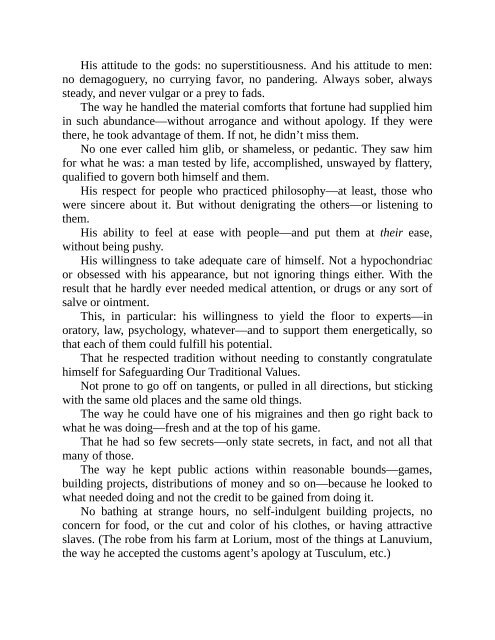9781945186240
Create successful ePaper yourself
Turn your PDF publications into a flip-book with our unique Google optimized e-Paper software.
His attitude to the gods: no superstitiousness. And his attitude to men:<br />
no demagoguery, no currying favor, no pandering. Always sober, always<br />
steady, and never vulgar or a prey to fads.<br />
The way he handled the material comforts that fortune had supplied him<br />
in such abundance—without arrogance and without apology. If they were<br />
there, he took advantage of them. If not, he didn’t miss them.<br />
No one ever called him glib, or shameless, or pedantic. They saw him<br />
for what he was: a man tested by life, accomplished, unswayed by flattery,<br />
qualified to govern both himself and them.<br />
His respect for people who practiced philosophy—at least, those who<br />
were sincere about it. But without denigrating the others—or listening to<br />
them.<br />
His ability to feel at ease with people—and put them at their ease,<br />
without being pushy.<br />
His willingness to take adequate care of himself. Not a hypochondriac<br />
or obsessed with his appearance, but not ignoring things either. With the<br />
result that he hardly ever needed medical attention, or drugs or any sort of<br />
salve or ointment.<br />
This, in particular: his willingness to yield the floor to experts—in<br />
oratory, law, psychology, whatever—and to support them energetically, so<br />
that each of them could fulfill his potential.<br />
That he respected tradition without needing to constantly congratulate<br />
himself for Safeguarding Our Traditional Values.<br />
Not prone to go off on tangents, or pulled in all directions, but sticking<br />
with the same old places and the same old things.<br />
The way he could have one of his migraines and then go right back to<br />
what he was doing—fresh and at the top of his game.<br />
That he had so few secrets—only state secrets, in fact, and not all that<br />
many of those.<br />
The way he kept public actions within reasonable bounds—games,<br />
building projects, distributions of money and so on—because he looked to<br />
what needed doing and not the credit to be gained from doing it.<br />
No bathing at strange hours, no self-indulgent building projects, no<br />
concern for food, or the cut and color of his clothes, or having attractive<br />
slaves. (The robe from his farm at Lorium, most of the things at Lanuvium,<br />
the way he accepted the customs agent’s apology at Tusculum, etc.)


